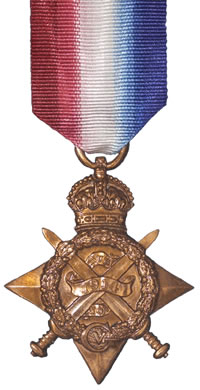Established in April 1917.
Also known as ‘Pip‘ or the ‘Mons Star‘.
This bronze medal award was authorized by King George V in April 1917 for those who had served in France or Belgium between 5th August 1914 to midnight on 22nd November 1914 inclusive. The award was open to officers and men of the British and Indian Expeditionary Forces, doctors and nurses as well as Royal Navy, Royal Marines, Royal Navy Reserve and Royal Naval Volunteer Reserve who served ashore with the Royal Naval Division in France or Belgium.
A narrow horizontal bronze clasp sewn onto the ribbon, bearing the dates ‘5th AUG. – 22nd NOV. 1914’ shows that the recipient had actually served under fire of the enemy during that period. For every seven medals issued without a clasp there were approximately five issued with the clasp.

Recipients who received the medal with the clasp were also entitled to attach a small silver heraldic rose to the ribbon when just the ribbon was being worn.
The reverse is plain with the recipient’s service number, rank, name and unit impressed on it.
It should be remembered that recipients of this medal were responsible for assisting the French to hold back the German army while new recruits could be trained and equipped. Collectively, they fully deserve a great deal of honour for their part in the first sixteen weeks of the Great War. This included the battle of Mons, the retreat to the Seine, the battles of Le Cateau, the Marne, the Aisne and the first battle of Ypres. There were approximately 378,000 1914 Stars issued.
